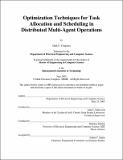Optimization techniques for task allocation and scheduling in distributed multi-agent operations
Author(s)
Tompkins, Mark F. (Mark Freeman), 1979-
DownloadFull printable version (765.9Kb)
Other Contributors
Massachusetts Institute of Technology. Dept. of Electrical Engineering and Computer Science.
Advisor
John J. Turkovich and Munther Dahleh.
Terms of use
Metadata
Show full item recordAbstract
This thesis examines scenarios where multiple autonomous agents collaborate in order to accomplish a global objective. In the environment that we consider, there is a network of agents, each of which offers different sets of capabilities or services that can be used to perform various tasks. In this environment, an agent formulates a problem, divides it into a precedence-constrained set of sub-problems, and determines the optimal allocation of these sub-problems/tasks to other agents so that they are completed in the shortest amount of time. The resulting schedule is constrained by the execution delay of each service, job release times and precedence relations, as well as communication delays between agents. A Mixed Integer-Linear Programming (MILP) approach is presented in the context of a multi-agent problem-solving framework that enables optimal makespans to be computed for complex classifications of scheduling problems that take many different parameters into account. While the algorithm presented takes exponential time to solve and thus is only feasible to use for limited numbers of agents and jobs, it provides a flexible alternative to existing heuristics that model only limited sets of parameters, or settle for approximations of the optimal solution. Complexity results of the algorithm are studied for various scenarios and inputs, as well as recursive applications of the algorithm for hierarchical decompositions of large problems, and optimization of multiple objective functions using Multiple Objective Linear Programming (MOLP) techniques.
Description
Thesis (M.Eng.)--Massachusetts Institute of Technology, Dept. of Electrical Engineering and Computer Science, 2003. Includes bibliographical references (p. 105-107). This electronic version was submitted by the student author. The certified thesis is available in the Institute Archives and Special Collections.
Date issued
2003Department
Massachusetts Institute of Technology. Department of Electrical Engineering and Computer SciencePublisher
Massachusetts Institute of Technology
Keywords
Electrical Engineering and Computer Science.